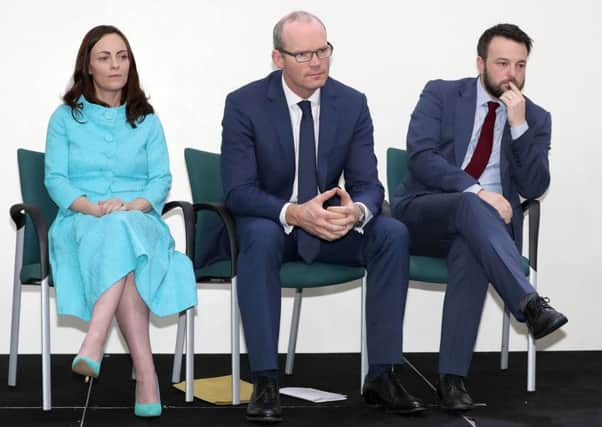Dublin will block move to next stage in Brexit talks unless Irish border plan is outlined, Coveney warns the UK


Speaking in Belfast yesterday morning (Wednesday), Simon Coveney said that there was solidarity between the Republic of Ireland and the EU negotiators over the need for progress on matters surrounding the land frontier.
Mr Coveney, who is also the Irish minister responsible for Brexit, told the SDLP-organised breakfast at Crumlin Road Gaol:
Advertisement
Hide AdAdvertisement
Hide Ad“There is an assumption I think by some that when the pressure comes on the Irish government will simply back off and not prevent progress to Phase Two, which is where everyone wants to go including the Irish government ... [but] there is a reason why we are not going to move on to Phase Two until there is sufficient progress on those issues.
“Otherwise what we do is we store up all the awkward and difficult decisions until the very end, and in that context it is my view Northern Ireland is very, very vulnerable.”
Mr Coveney said that there were three areas in which the EU expected progress before moving on to the next stage in its EU talks: the rights of EU citizens; the financial settlement that the UK had to pay; and then Ireland.
On the first two issues there had been some progress he said. Within the latter issue, the Irish question, three further sub issues had to be resolved: the Common Travel Area; the Good Friday Agreement (“how do we follow through on the clear commitment the British government has made ... to the full implementation of all of the detail of the GFA?”); and then there was the third issue, the border.
Advertisement
Hide AdAdvertisement
Hide AdMr Coveney talked about how the border had changed over the last 30 years, “that painful journey that many of you have been involved in, the success of it essentially has been largely invisible”.
“It is a seamless relationship, livestock moves around, product moves around, people move around,” he said. “And I, for one, am not going to be part of an Irish government that allows that progress to be reversed. And I will make that promise here, just like I will make it in Dublin and I will make it in Cork.”
Mr Coveney continued: “Anybody who thinks that we see this issue purely in trade terms, in terms of trade numbers, fundamentally misunderstands the depth of feeling in the context of the politics of the border and of course the politics of the implementation of the GFA.”
Mr Coveney then appeared to say that a solution would have to involve Northern Ireland staying in both the single market and the customs union, or some arrangement close to that.
Advertisement
Hide AdAdvertisement
Hide Ad“ ... And so what we have insisted upon, which seems to have raised the hackles of some, is a language which now says that it seems essential for us that the UK commit to ensuring that a hard border on the island of Ireland can be avoided by ensuring no emergence of regulatory divergence in those rules of the internal market and the customs union which are, and in our view will be in the future, necessary for meaningful north south cooperation, the all island economy and the protection of the Good Friday Agreement.
“That is the language of the EU task force that we have absolute solidarity on in relation to this and that is now why are in an awkward impasse, if the truth be told.”
He said that London was saying they could look at that issue when negotiating a trade agreement between the UK and EU: “We’re saying great, we hope that is possible, but sorry you can’t ask us to jump into the dark yet not knowing where we’re going to land.”
He said they were not demanding a “complete solution” from Britain now but they needed clear parameters on future arrangements before negotiations could go on.
Advertisement
Hide AdAdvertisement
Hide Ad“If you have a different rule-book by which business operates in Northern Ireland versus Ireland, there is no way of avoiding border checks. That is the reality, whether those border checks happen on the border, or in business premises or in farmyards is a different issue, but as far as I am concerned that is all border infrastructure preventing free movement, preventing trade, undermining the relationships that have been built up over the last 20 years, and it’s about building barriers rather than bridges on this island and we won’t stand for it.”
That was Dublin’s firmly held position, he said, but added that British-Irish relations were better now than they had ever been in his lifetime.
It was he said, time for “straight talk”, on these issues.